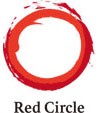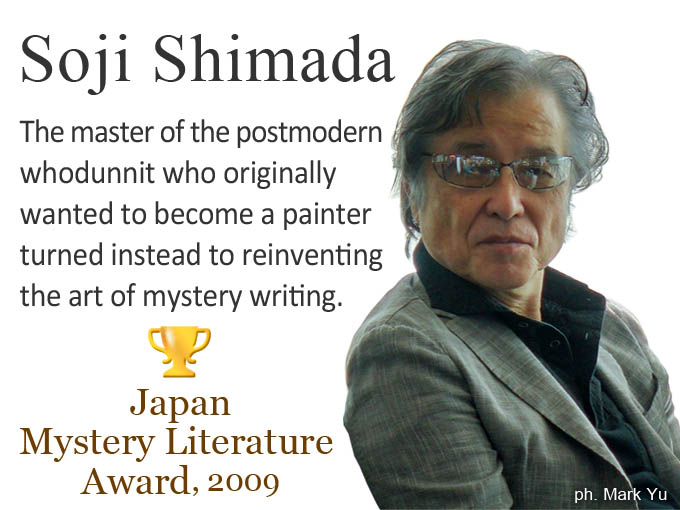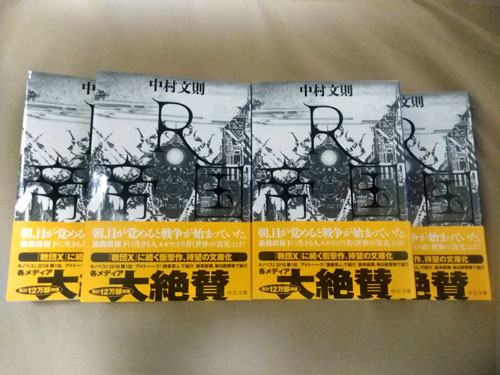 Copies of paperback edition of R Empire (R帝国) by Fuminori Nakamura published 21 May 2020. Photograph: Fuminori Nakamura
Copies of paperback edition of R Empire (R帝国) by Fuminori Nakamura published 21 May 2020. Photograph: Fuminori NakamuraThe bunko, paperback, edition, of the novel originally published in tanko, hardback, in 1997, is being published by Chuokoron-Shinsha, Inc, one of Japan’s largest publishing houses, who also published the hardback.
Following its acquisition in 1999, Chuokoron is now a sister company of the Yomiuri Shimbun, Japan’s most widely read newspaper, which serialised R Empire in its evening edition in 2017.
Extracts from Nakamura’s R Empire were published daily over a six-month period (May 23 2016 – February 2nd 2017) in the newspaper before the release of the hardback.
Reader feedback was excellent and Nakamura’s story captivated the nation with its undertones of our troubled times: a North Korean-like all powerful state, fake and manipulated news, and a population encouraged and “nudged” into drug addiction.
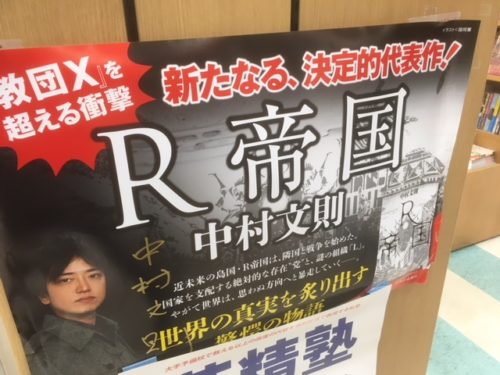 In store promotion at a Kinokuniya bookshop in Yokohama for Fuminori Nakamura’s novel R Empire (hardback). Photograph: Red Circle Authors Limited.
In store promotion at a Kinokuniya bookshop in Yokohama for Fuminori Nakamura’s novel R Empire (hardback). Photograph: Red Circle Authors Limited.R Empire is set in the future in a country dominated by the party of ‘absolute power’ where people receive information through advanced Artificial Intelligence (AI) terminals called HPs.
The book begins with a quote from Adolf Hitler (1889-1945) that sets the scene:
“The great masses of the people will more easily fall victim to a big lie than to a small one”.
The story commences as a war is initiated. All wars need to be justified, but there is something different and seemingly fraudulent about this particular one, as Yazaki an ordinary salaryman and Kirihara a former secretary to a senior member of the “opposition” party observes.
This is “a war novel without a hero” that forces readers to reflect on the times we live in, in a similar manner to 1984, by amplifying some of society’s dark trends, taking them to their grim extremes in an imagined society of the near future.
The novel’s dramatic and bleak cover design by the renowned illustrator Shogun Neko (猫 将軍), has like the story itself, drawn praise and elicited attention, from both the critics and Japan’s reading public.
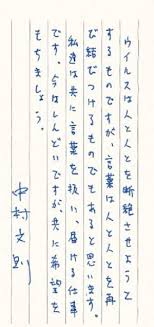 Copy of one of the hand-written letters by Fuminori Nakamura to Japanese booksellers sent on publication of his novel April 2020. Photograph: Toyo Kezai
Copy of one of the hand-written letters by Fuminori Nakamura to Japanese booksellers sent on publication of his novel April 2020. Photograph: Toyo KezaiNakamura and the publisher Gentosha received sample print copies of The Fugitive on the 16th of April, the day Japan declared a state of emergency due to the worsening of the coronavirus outbreak, and the book’s official publication date.
They decide that publication should still go ahead as normal, but the next day Nakamura wrote a series of handwritten letters to bookstores across Japan asking for their continued support, explaining the decision to go ahead with publication and stressing the importance of “togetherness” during this time of enforced distancing.
Nakamura has publicly expressed his concern that the coronavirus may speed up societal trends, not just the often mentioned adoption of new technology platforms, but also discrimination and the polarisation of society itself; themes that are often reflected in his novels.
The virus is a “natural disaster,” he says, but Nakamura fears that what may come next may be “a man-made disaster”.
In The Fugitive, a mesmeric tale of faith, war and love, Nakamura takes the reader on another gripping journey. One that spans the periods when Japanese Christians lived in hiding in fear for their lives, through to the Second World War and the present day.
Both the books penned by Nakamura stress the importance of the individual and what he likes to call “freethinking” – the title of his recently published and only published collection of essays.
Nakamura also warns that often the victim is blamed or found to be at fault when society finds itself under duress, another of society’s darker trends, and one which he argues is particularly prevalent in Japan. “Distance creates misunderstandings and dislocation,” he adds.
The Fugitive, like many of Nakamura’s recent works, has been serlialised in four different daily newspapers that serve different regions in Japan.
Nakamura is having a busy few months. In addition to these two new releases he was also awarded the Chunichi Bunka Award in May by the Chunichi Shimbun, a newspaper with a large readership in Aichi Prefecture, which is located in central Japan.
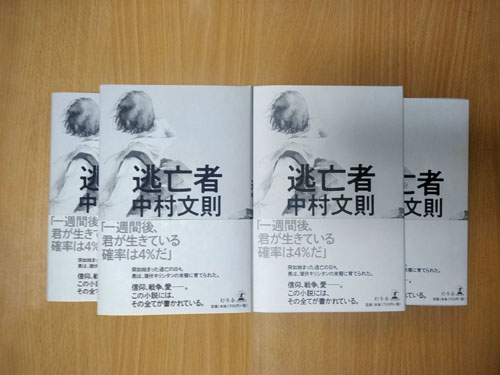 Copies of The Fugitive, Tobosha, a full-length novel by Fuminori Nakamura, published April 2020. Photograph: Fuminori Nakamura
Copies of The Fugitive, Tobosha, a full-length novel by Fuminori Nakamura, published April 2020. Photograph: Fuminori Nakamura About Red Circle:Red Circle Authors Limited is a specialist publishing and communications company that conducts bespoke projects on behalf of a carefully selected and curated group of leading Japanese authors. Red Circle showcases Japan’s best creative writing. For more information on Red Circle, Japanese literature, and Red Circle authors please visit: www.redcircleauthors.com.
About Red Circle:Red Circle Authors Limited is a specialist publishing and communications company that conducts bespoke projects on behalf of a carefully selected and curated group of leading Japanese authors. Red Circle showcases Japan’s best creative writing. For more information on Red Circle, Japanese literature, and Red Circle authors please visit: www.redcircleauthors.com.

